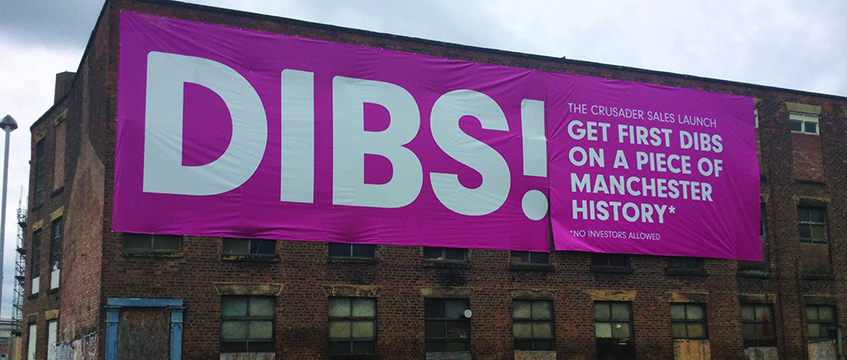Capital & Centric is taking the unusual step of offering the first homes at its 201-flat residential scheme in Manchester exclusively to locals struggling to find city centre flats that have not already been sold off-plan to overseas investors.
The developer, which uses the tagline “no investors allowed” has already had 400 registrations from prospective owner occupiers for the first 20 homes at Crusader, a £50m converted textile mill scheme near Manchester’s Piccadilly station, which will be formally put up for sale this weekend.
The price of the one- and two-bedroom flats range from £165,000 to around £500,000. Buyers will be asked to pay a 5% deposit, with the flats due to be delivered in autumn 2019.
“We’re not marketing this abroad, we’re not using investment agents,” says Capital & Centric co-founder Tim Heatley. “Crusader is for the people and we’d love nothing more than a landslide of demand from genuine buyers.” Assuming the process is successful, the developer intends to restrict all sales to owner occupiers.
Overseas trend spreads
The practice of selling flats off plan to overseas investors has become commonplace for Manchester’s growing roster of residential towers. An investigation earlier this year found more than 93% of flats in the 282-unit Renaker’s One Cambridge Street near Oxford Road had been bought by foreign residents or companies overseas.
In London, the practice sparked political intervention from former mayor Boris Johnson in 2014, when he unveiled a “concordat” scheme which signed up 50 developers to committing to prioritise local buyers. Current mayor Sadiq Khan branded the project a “failure” because it wasn’t monitored and didn’t prevent developers from simultaneously marketing new homes overseas. He commissioned a review on foreign ownership of homes in the capital and said homes for Londoners was a “top priority”.
The issue has not yet received any notable political scrutiny in Manchester. However, the trend means only one city centre development is understood to currently offer Help to Buy: the 124-flat Murrays’ Mills in Ancoats, which is being delivered by Manchester Life – a joint venture between Manchester City Council and Abu Dhabi United Group.
This shows government schemes to help people get on the housing ladder have not been working in the city.
Heatley admits that initial interest may not translate into sales, but a survey of 500 local residents found 76% believe it is hard to buy a flat in the city centre, despite the fact that 6,963 homes were under construction in January 2017, compared to 2,982 the previous year, according to Deloitte Real Estate’s Crane Survey.
Capital & Centric wants to fill the gap. “It seemed to us that everybody was doing the same thing, selling it off plan, which understandably has a place. There’s demand for it and it works as a developer,” says Heatley. “But where we can, we always try and avoid competition by doing the opposite of what the competition is doing.”
Scheme viability
Heatley says one of the national agents they considered instructing to sell the flats was “furious” with their decision to sell exclusively to owner occupiers.
“For them, it’s disrupting their business model which is, ‘We take them away, we sell 200 over the course of a week or two, we come back, we collect our fee and move on to the next one,’” he says.
“So, they weren’t at all happy with our approach, which obviously requires a lot more work and a lot more effort. You have to get involved with 200 apartments, with 200 life stories with people – what journey they’ve come on, why they want to be here.”
Savills’ associate director of residential development sales, Jamie Adam, agrees there is a problem with local people being able to access city centre homes and says he advises developers to hold back a number of flats to local people where possible.
However, he also says there is a need to sell off plan to enable viability for many schemes.
“The nature of quite a few of the larger schemes in Manchester is that they are long term major projects,” he says. “By their very nature, because they’re high rise, they have to be bought up in one go. There just isn’t an opportunity in a lot of them to phase them because it’s not cost effective to do so. Understandably, developers would take those reservations from an overseas buyer or a UK investor, early doors if they could do.”
To send feedback, e-mail Louisa.Clarence-Smith@egi.co.uk or tweet @LouisaClarence or @estatesgazette

















